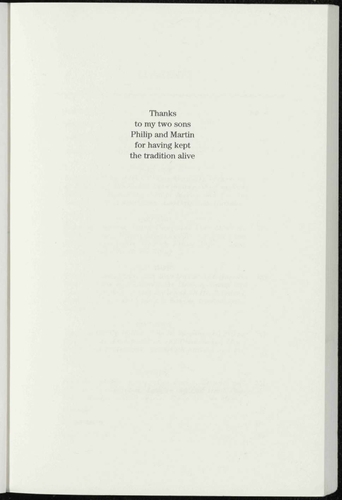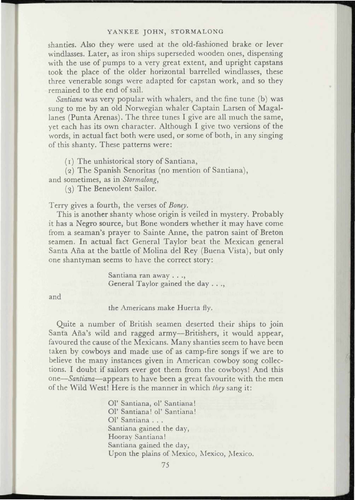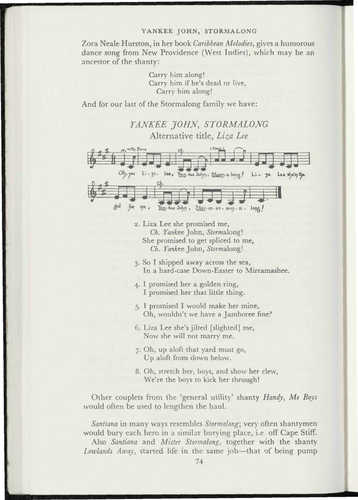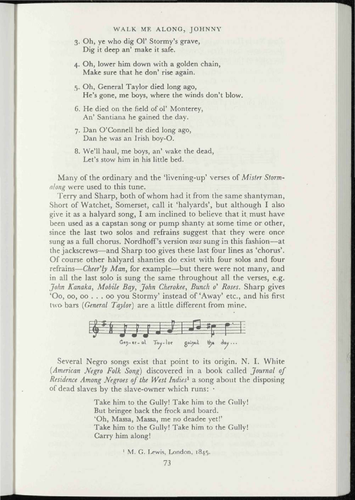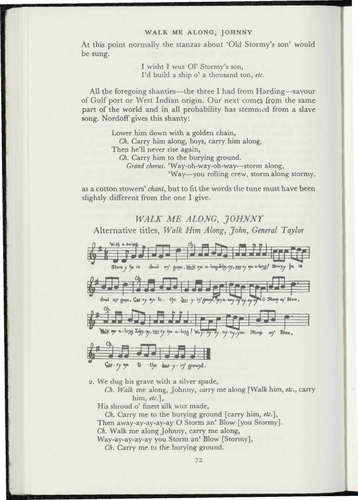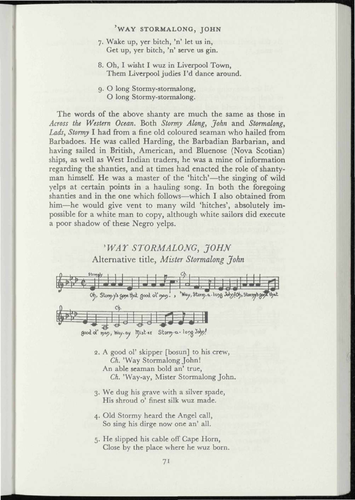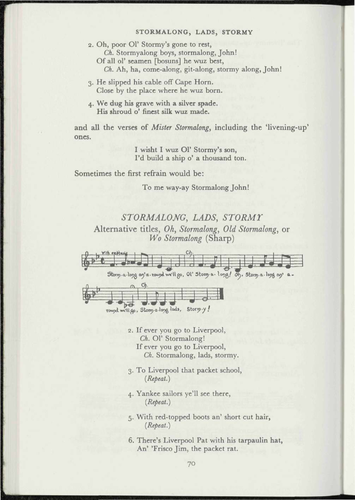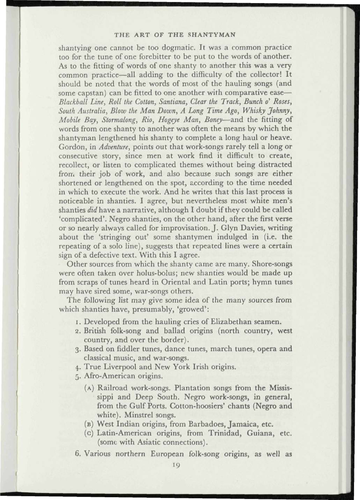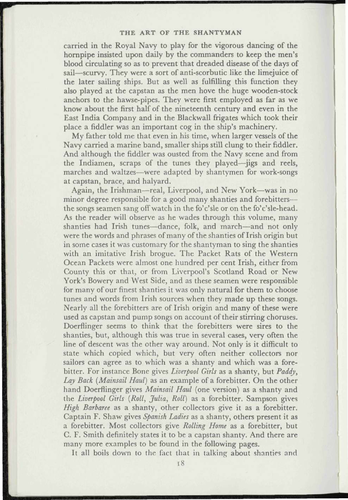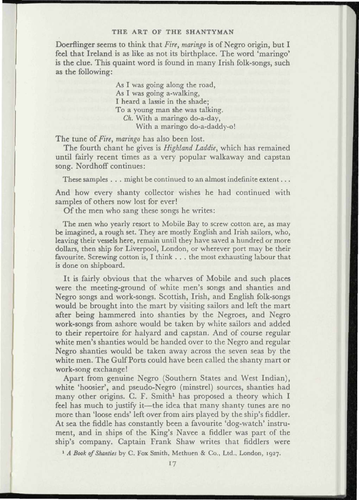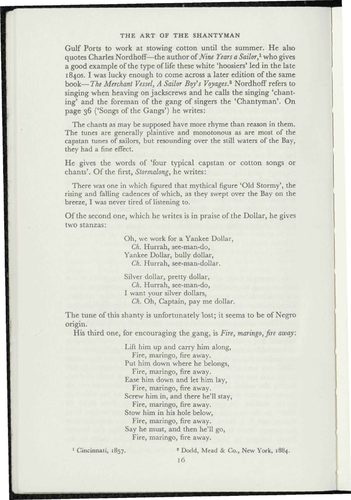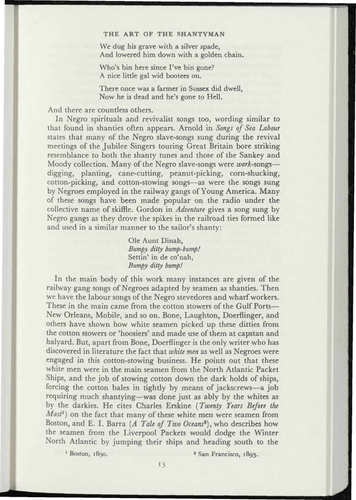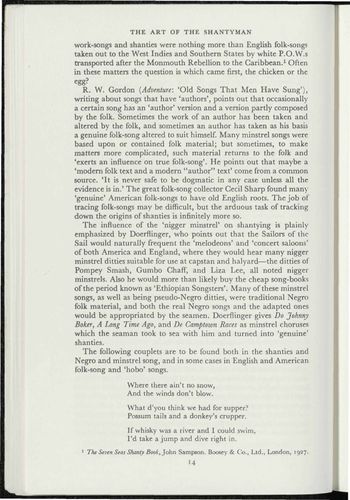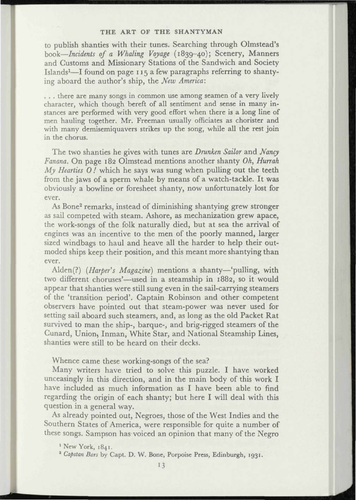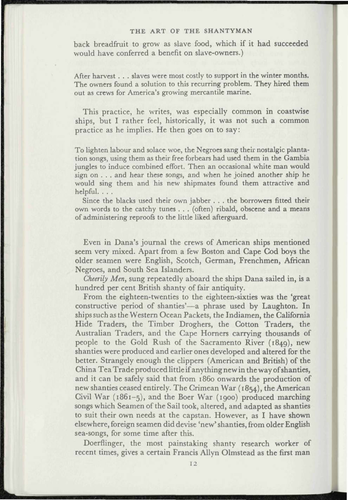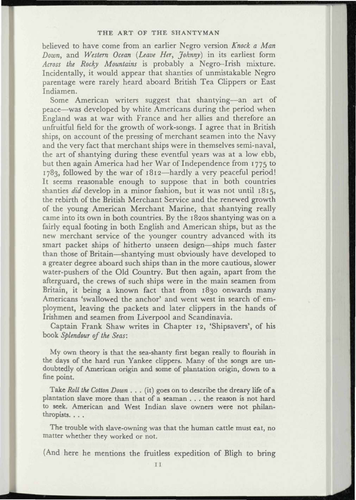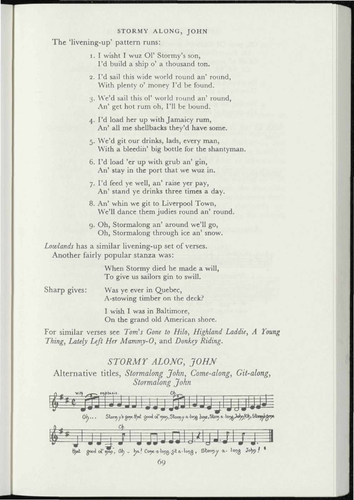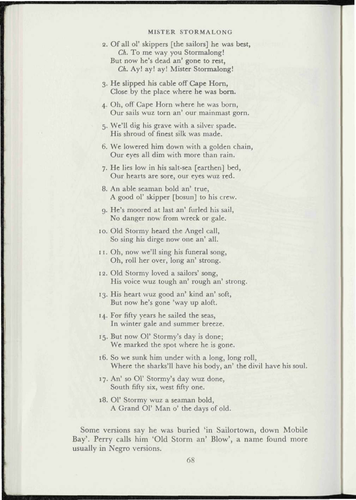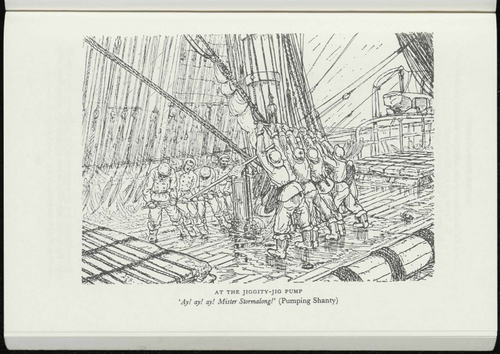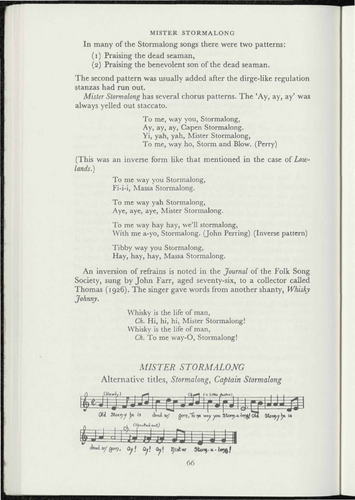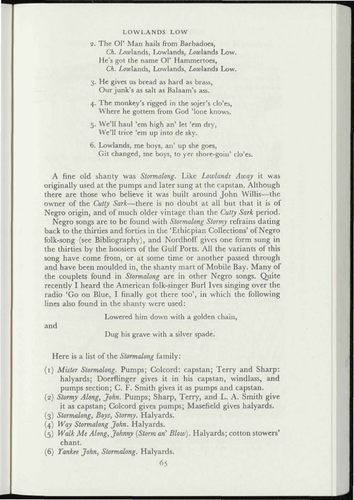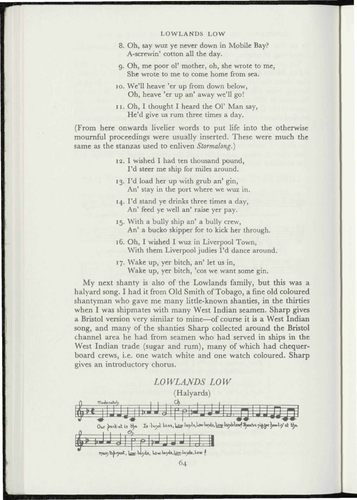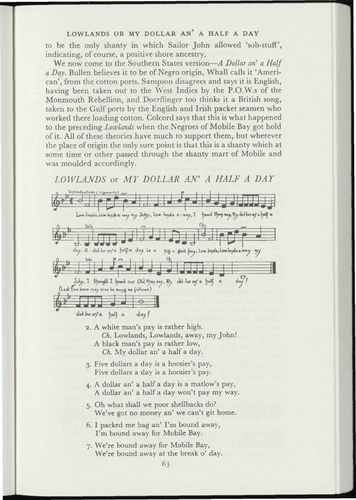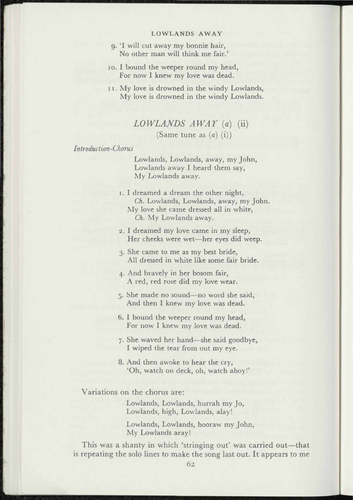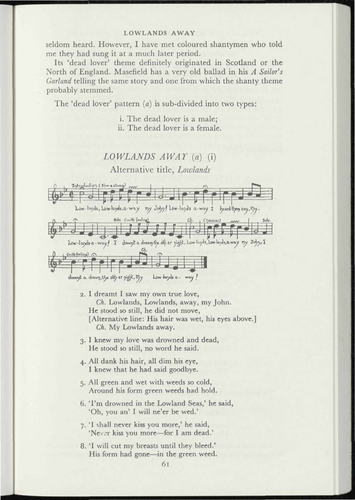8.510 afbeeldingen
sorteren op:
049 Shanties From The Seven Seas

Shanties From The Seven Seas,
Titel:
Shanties From The Seven Seas
Naam uitgever:
MYSTIC SEAPORT MUSEUM
Jaar van uitgave:
First Published 1961
Omschrijving:
Voorwoord
Aantal pagina's:
430
Taal:
Engels
Plaats van uitgave:
Connecticut
Auteur:
Collected by Stan Hugill
Voorbeeld : Klik op de tekst voor meer
Organisatie: Shanty Nederland
laatste wijziging 07-02-2023
1 gedigitaliseerd
049 Shanties From The Seven Seas

Shanties From The Seven Seas,
Titel:
Shanties From The Seven Seas
Naam uitgever:
MYSTIC SEAPORT MUSEUM
Jaar van uitgave:
First Published 1961
Taal:
Engels
Aantal pagina's:
430
Plaats van uitgave:
Connecticut
Auteur:
Collected by Stan Hugill
Organisatie: Shanty Nederland
laatste wijziging 07-02-2023
1 gedigitaliseerd
049 Shanties From The Seven Seas

Shanties From The Seven Seas,
Titel:
Shanties From The Seven Seas
Naam uitgever:
MYSTIC SEAPORT MUSEUM
Jaar van uitgave:
First Published 1961
Taal:
Engels
Aantal pagina's:
430
Plaats van uitgave:
Connecticut
Auteur:
Collected by Stan Hugill
Organisatie: Shanty Nederland
laatste wijziging 07-02-2023
1 gedigitaliseerd
049 Shanties From The Seven Seas

Shanties From The Seven Seas,
Titel:
Shanties From The Seven Seas
Naam uitgever:
MYSTIC SEAPORT MUSEUM
Jaar van uitgave:
First Published 1961
Taal:
Engels
Aantal pagina's:
430
Plaats van uitgave:
Connecticut
Auteur:
Collected by Stan Hugill
Organisatie: Shanty Nederland
laatste wijziging 07-02-2023
1 gedigitaliseerd
049 Shanties From The Seven Seas

Shanties From The Seven Seas,
Titel:
Shanties From The Seven Seas
Naam uitgever:
MYSTIC SEAPORT MUSEUM
Jaar van uitgave:
First Published 1961
Taal:
Engels
Aantal pagina's:
430
Plaats van uitgave:
Connecticut
Auteur:
Collected by Stan Hugill
Organisatie: Shanty Nederland
laatste wijziging 07-02-2023
1 gedigitaliseerd
049 Shanties From The Seven Seas

Shanties From The Seven Seas,
Titel:
Shanties From The Seven Seas
Naam uitgever:
MYSTIC SEAPORT MUSEUM
Jaar van uitgave:
First Published 1961
Taal:
Engels
Aantal pagina's:
430
Plaats van uitgave:
Connecticut
Auteur:
Collected by Stan Hugill
Organisatie: Shanty Nederland
laatste wijziging 07-02-2023
1 gedigitaliseerd
049 Shanties From The Seven Seas

Shanties From The Seven Seas,
Titel:
Shanties From The Seven Seas
Naam uitgever:
MYSTIC SEAPORT MUSEUM
Jaar van uitgave:
First Published 1961
Taal:
Engels
Aantal pagina's:
430
Plaats van uitgave:
Connecticut
Auteur:
Collected by Stan Hugill
Organisatie: Shanty Nederland
laatste wijziging 07-02-2023
1 gedigitaliseerd
049 Shanties From The Seven Seas
Organisatie: Shanty Nederland
laatste wijziging 07-02-2023
1 gedigitaliseerd
049 Shanties From The Seven Seas
Organisatie: Shanty Nederland
laatste wijziging 07-02-2023
1 gedigitaliseerd
049 Shanties From The Seven Seas

Shanties From The Seven Seas,
Titel:
Shanties From The Seven Seas
Naam uitgever:
MYSTIC SEAPORT MUSEUM
Jaar van uitgave:
First Published 1961
Taal:
Engels
Aantal pagina's:
430
Plaats van uitgave:
Connecticut
Auteur:
Collected by Stan Hugill
Organisatie: Shanty Nederland
laatste wijziging 07-02-2023
1 gedigitaliseerd
049 Shanties From The Seven Seas

Shanties From The Seven Seas,
Titel:
Shanties From The Seven Seas
Naam uitgever:
MYSTIC SEAPORT MUSEUM
Jaar van uitgave:
First Published 1961
Taal:
Engels
Aantal pagina's:
430
Plaats van uitgave:
Connecticut
Auteur:
Collected by Stan Hugill
Organisatie: Shanty Nederland
laatste wijziging 07-02-2023
1 gedigitaliseerd
049 Shanties From The Seven Seas

Shanties From The Seven Seas,
Titel:
Shanties From The Seven Seas
Naam uitgever:
MYSTIC SEAPORT MUSEUM
Jaar van uitgave:
First Published 1961
Taal:
Engels
Aantal pagina's:
430
Plaats van uitgave:
Connecticut
Auteur:
Collected by Stan Hugill
Organisatie: Shanty Nederland
laatste wijziging 07-02-2023
1 gedigitaliseerd
049 Shanties From The Seven Seas
Organisatie: Shanty Nederland
laatste wijziging 07-02-2023
1 gedigitaliseerd
049 Shanties From The Seven Seas
Organisatie: Shanty Nederland
laatste wijziging 07-02-2023
1 gedigitaliseerd
049 Shanties From The Seven Seas
Organisatie: Shanty Nederland
laatste wijziging 07-02-2023
1 gedigitaliseerd
049 Shanties From The Seven Seas
Organisatie: Shanty Nederland
laatste wijziging 07-02-2023
1 gedigitaliseerd
049 Shanties From The Seven Seas

Shanties From The Seven Seas,
Titel:
Shanties From The Seven Seas
Naam uitgever:
MYSTIC SEAPORT MUSEUM
Jaar van uitgave:
First Published 1961
Taal:
Engels
Aantal pagina's:
430
Plaats van uitgave:
Connecticut
Auteur:
Collected by Stan Hugill
Organisatie: Shanty Nederland
laatste wijziging 07-02-2023
1 gedigitaliseerd
049 Shanties From The Seven Seas

Shanties From The Seven Seas,
Titel:
Shanties From The Seven Seas
Naam uitgever:
MYSTIC SEAPORT MUSEUM
Jaar van uitgave:
First Published 1961
Taal:
Engels
Aantal pagina's:
430
Plaats van uitgave:
Connecticut
Auteur:
Collected by Stan Hugill
Organisatie: Shanty Nederland
laatste wijziging 07-02-2023
1 gedigitaliseerd
049 Shanties From The Seven Seas

Shanties From The Seven Seas,
Titel:
Shanties From The Seven Seas
Naam uitgever:
MYSTIC SEAPORT MUSEUM
Jaar van uitgave:
First Published 1961
Taal:
Engels
Aantal pagina's:
430
Plaats van uitgave:
Connecticut
Auteur:
Collected by Stan Hugill
Voorbeeld : Klik op de tekst voor meer
Organisatie: Shanty Nederland
laatste wijziging 07-02-2023
1 gedigitaliseerd
049 Shanties From The Seven Seas

Shanties From The Seven Seas,
Titel:
Shanties From The Seven Seas
Naam uitgever:
MYSTIC SEAPORT MUSEUM
Jaar van uitgave:
First Published 1961
Taal:
Engels
Aantal pagina's:
430
Plaats van uitgave:
Connecticut
Auteur:
Collected by Stan Hugill
Organisatie: Shanty Nederland
laatste wijziging 07-02-2023
1 gedigitaliseerd
049 Shanties From The Seven Seas

Shanties From The Seven Seas,
Titel:
Shanties From The Seven Seas
Naam uitgever:
MYSTIC SEAPORT MUSEUM
Jaar van uitgave:
First Published 1961
Taal:
Engels
Aantal pagina's:
430
Plaats van uitgave:
Connecticut
Auteur:
Collected by Stan Hugill
Organisatie: Shanty Nederland
laatste wijziging 07-02-2023
1 gedigitaliseerd
049 Shanties From The Seven Seas

Shanties From The Seven Seas,
Titel:
Shanties From The Seven Seas
Naam uitgever:
MYSTIC SEAPORT MUSEUM
Jaar van uitgave:
First Published 1961
Taal:
Engels
Aantal pagina's:
430
Plaats van uitgave:
Connecticut
Auteur:
Collected by Stan Hugill
Organisatie: Shanty Nederland
laatste wijziging 07-02-2023
1 gedigitaliseerd
049 Shanties From The Seven Seas

Shanties From The Seven Seas,
Titel:
Shanties From The Seven Seas
Naam uitgever:
MYSTIC SEAPORT MUSEUM
Jaar van uitgave:
First Published 1961
Taal:
Engels
Aantal pagina's:
430
Plaats van uitgave:
Connecticut
Auteur:
Collected by Stan Hugill
Organisatie: Shanty Nederland
laatste wijziging 07-02-2023
1 gedigitaliseerd
049 Shanties From The Seven Seas

Shanties From The Seven Seas,
Titel:
Shanties From The Seven Seas
Naam uitgever:
MYSTIC SEAPORT MUSEUM
Jaar van uitgave:
First Published 1961
Taal:
Engels
Aantal pagina's:
430
Plaats van uitgave:
Connecticut
Auteur:
Collected by Stan Hugill
Organisatie: Shanty Nederland
laatste wijziging 07-02-2023
1 gedigitaliseerd
049 Shanties From The Seven Seas

Shanties From The Seven Seas,
Titel:
Shanties From The Seven Seas
Naam uitgever:
MYSTIC SEAPORT MUSEUM
Jaar van uitgave:
First Published 1961
Taal:
Engels
Aantal pagina's:
430
Plaats van uitgave:
Connecticut
Auteur:
Collected by Stan Hugill
Organisatie: Shanty Nederland
laatste wijziging 07-02-2023
1 gedigitaliseerd

 Mijn Studiezaal (inloggen)
Mijn Studiezaal (inloggen)